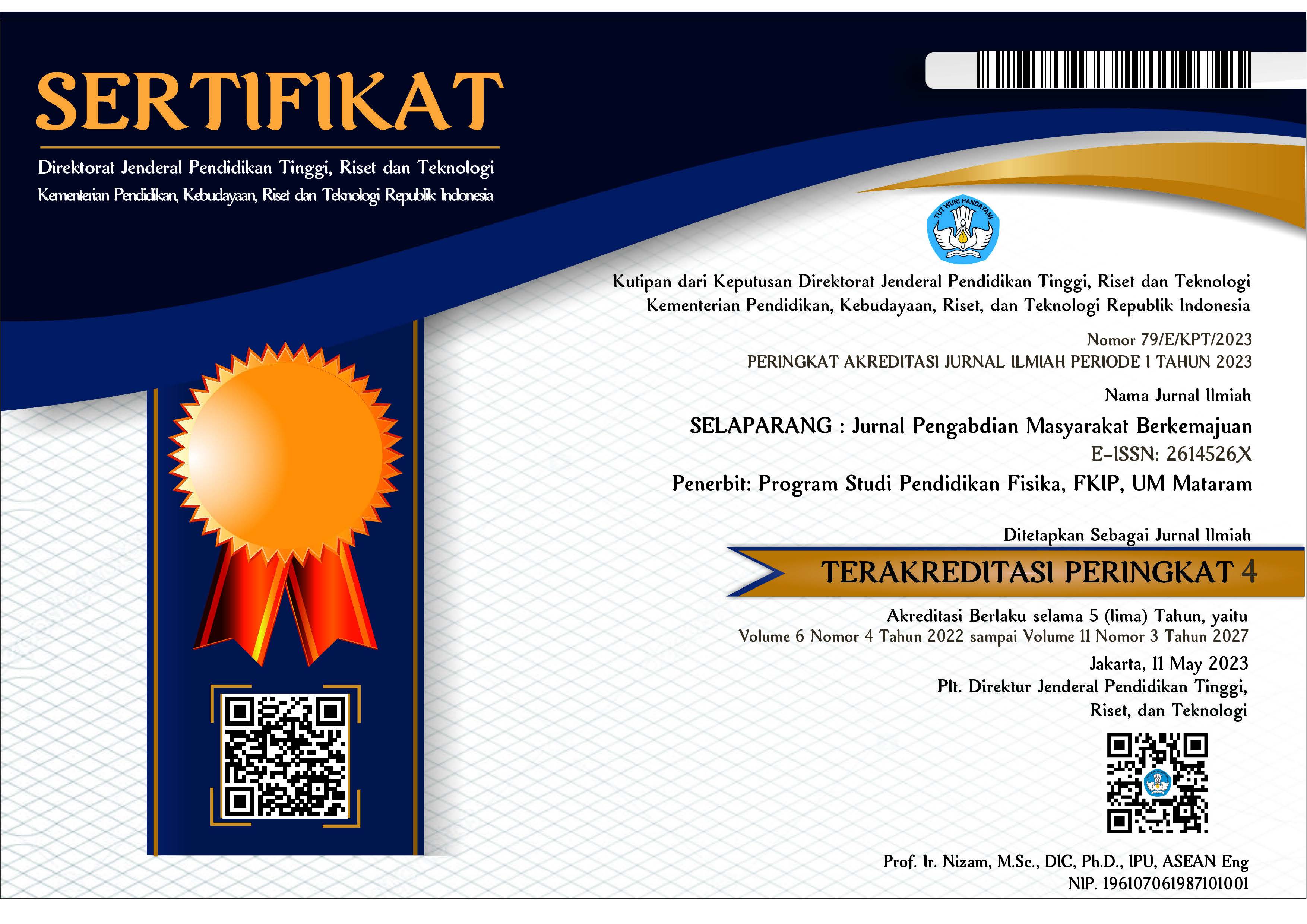DISABILITY AWARENESS PADA SISWA SEKOLAH INKLUSI
Abstract
ABSTRAK
Keberadaan pendidikan inklusi menyediakan akses yang lebih besar pada kurikulum umum, meningkatkan interaksi sosial dan memiliki harapan yang lebih tinggi bagi siswa penyandang disabilitas. Namun, siswa penyandang disabilitas juga seringkali mendapatkan stigma dari teman-teman sebayanya yang dapat menimbulkan dampak kesehatan fatal, seperti meningkatkan rasa kesepian dan kecemasan dari korban, serta dapat mengurangi harga diri mereka. Peluang munculnya diskriminasi, lingkungan kelas yang negatif, atau sikap negatif dari teman sebaya bisa disebabkan karena banyak siswa yang belum mendapatkan edukasi sehingga mereka tidak mengetahui, memahami, tidak menerima, dan berempati dengan siswa penyandang disabilitas. Untuk itu, edukasi mengenai kesadaran tentang disabilitas (disability awareness) amat penting bagi sekolah karena mampu mengedukasi siswa sehingga mereka menjadi warga yang lebih baik. Berdasarkan hasil pengamatan di lapangan, ternyata masih ada siswa-siswa di SMA Muhammaddiyah 1 Malang yang belum memahami bagaimana bersikap terhadap teman disabilitas. Maka, kegiatan pengabdian kepada masyarakat dengan metode psikoedukasi ini diberikan dengan tujuan untuk meningkatkan sikap penerimaan, pemahaman, dan pengetahuan tentang disabilitas pada siswa reguler, sehingga dapat menurunkan sikap negatif terhadap siswa penyandang disabilitas. Hasil kegiatan ini menunjukkan bahwa para siswa meningkat pemahamannya mengenai konsep-konsep disabilitas. Selain itu para peserta juga memberikan tanggapan positif atas berlangsungnya kegiatan ini.
Kata kunci: kesadaran disabilitas; siswa SMA
ABSTRACT
Inclusion education provides greater access to the general curriculum, improves social interaction and has higher expectations for students with disabilities. However, students with disabilities often got stigma from their peers which can have fatal health impacts, such as increasing loneliness and anxiety from victims, and reduce their self-esteem. The chances of discrimination, a negative classroom environment, or negative attitudes from peers can be due to many students who have not received education so they do not know, understand, accept, and empathize with students with disabilities. Therefore, education about disability awareness is very important for schools because it is able to educate students so that they become better citizens. Based on early observations in school, there are some students at SMA Muhammadiyah 1 Malang who do not understand how to behave towards friends with disabilities. Then community-oriented activity with psychoeducational method aims to improve acceptance, understanding, and knowledge of disabilities in regular students, so as to reduce negative attitudes towards students with disabilities. The results showed that students improved their understanding of the concepts of disability. In addition, the participants also gave positive responses to the activities.
Keywords: disability awareness; high school students.
Keywords
Full Text:
PDFReferences
Anwar, Z. & Rahmah, M. (2016). Psikoedukasi tentang Resiko Perkawinan Usia Muda untuk Menurunkan Intensi Pernikahan Dini pada Remaja. Jurnal Psikologi, 1(1), 1–14. https://doi.org/10.21070/psikologia.v1i1.749
Armstrong, M., Morris, C., Abraham, C. & Tarrant, M. (2017). Interventions utilising contact with people with disabilities to improve children’s attitudes towards disability: a systematic review and meta-analysis. Disability and Health Journal, 10(1), 11–22. https://doi.org/10.1016/j.dhjo.2016.10.003
Bossaert, G., Colpin, H., Pijl, S. J. & Petry, K. (2012). Truly included? A literature study focusing on the social dimension of inclusion in education. International Journal of Inclusive Education, 17, 60–79.
Ellman, L. (2012). Opening Eyes to the Blind: A Unit Plan that Confronts Ableism in a Standards-Based General Education Classroom. The Clearing House, 85, 15–22.
Gasser, L., Malti, T. & Buholzer, A. (2013). Children’s moral judgments and moral emotions following exclusion of children with disabilities: Relations with inclusive education, age and contact intensity. Research in Developmental Disabilities, 34, 948–958.
Ison, N., McIntyre, S., Rothery, S., Smithers-Sheedy, H Goldsmith, S Parsonage, S. & Foy, L. (2010). Just Like You’: A Disability Awareness Programme For Children That Enhanced Knowledge, Attitudes And Acceptance: Pilot Study Findings. Developmental Neurorehabilitation, 13(5), 360–368. https://doi.org/10.3109/17518423.2010.496764
Koster, M., Nakken, H., Pijl, S. J., Van Houten, E. & Spelberg, H. C. L. (2008). Assessing social participation of pupils with special needs in inclusive education: The construction of a teacher questionnaire. Educational Research and Evaluation: An International Journal on Theory and Practice, 14, 395–409.
Krahe, B. & Altwaser, C. (2006). Changing Negative Attitudes towards Persons with Physical Disabilities: An Experimental Intervention. Journal of Community & Applied Social Psychology, 16, 56–69.
Lindsay, S. & Edwards, A. (2013). A systematic review of disability awareness interventions for children and youth. Disability & Rehabilitation, 35(8), 623–646. https://doi.org/10.3109/09638288.2012.702850
Loucks, Lauren Townsend, A. (2016). Ability Awareness Activities. https://static1.squarespace.com/static/57152c501bbee02fa933fd7a/t/582601e92994cabb3535090d/1478885865996/LL_AT-OAHPERD_Presentation_handout-2016.pdf
Maich, K. & Belcher, E. C. (2011). Using Picture Books to Create Peer Awareness About Autism Spectrum Disorders in the Inclusive Classroom. Intervention in School and Clinic, 47(4), 206–213. https://doi.org/10.1177/1053451211424600
Morin, D., Rivard, M., Crocker, A., Boursier, C. & Caron, J. (2013). Public Attitudes towards Intellectual Disability: a Multidimensional perspective. Journal of Intellectual Disability, 57(3), 279–292. https://doi.org/10.1111/jir.12008
Mrug, S. & Wallander, L. J. (2002). Self-Concept of Young People with Physical Disabilities: does integration play a role? Journal of Disability, Development and Education, 49(3), 267–274.
Ramirez, V. P. (2018). Teaching Disability Awareness to School-Aged Children. https://digitalcommons.csumb.edu/caps_thes_all/245
Rillotta, F. & Nettlebeck, T. (2007). Effects Of An Awareness Program On Attitudes Of Students Without An Intellectual Disability Towards Persons With An Intellectual Disability. Journal of Intellectual & Developmental Disability, 32(19–29).
Schwab., S. (2015). Social dimensions of inclusion in education of 4th and 7th grade pupils in inclusive and regular classes: Outcomes from Austria. Research in Developmental Disabilities, 43–44, 72–79.
Wang, Z., Xu, X., Han, Q., Chen, Y., Jiang, J. & Ni, G. (2021). Factors associated with public attitudes towards persons with disabilities: a systematic review. BMC Public Health, 21, 1–15. https://doi.org/10.1186/s12889-021-11139-3
Williamson, C. (2014). Effects of Disability Awareness Educational Programs on an Effects of Disability Awareness Educational Programs on an Inclusive Classroom Inclusive Classroom Part of the Disability and Equity in Education Commons, Educational Methods Commons, and the Spec. Honors Project, 134, 1–32. https://scholarworks.bgsu.edu/honorsprojects
DOI: https://doi.org/10.31764/jpmb.v4i3.5382
Refbacks
- There are currently no refbacks.

This work is licensed under a Creative Commons Attribution-ShareAlike 4.0 International License.
______________________________________________________
Jurnal Selaparang
p-ISSN 2614-5251 || e-ISSN 2614-526X
EDITORIAL OFFICE:



















